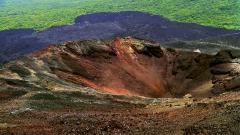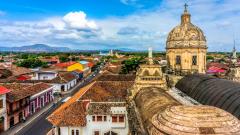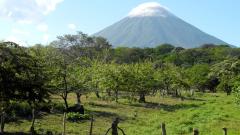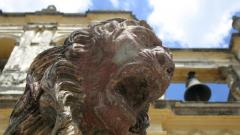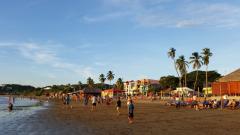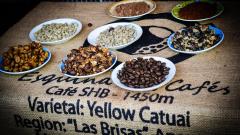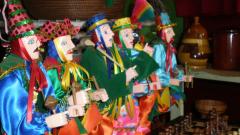 travel to Nicaragua
travel to Nicaragua
The Republic of Nicaragua is located within Central America, bordering Honduras and El Salvador to the north and south to Costa Rica. The eastern part of the country is bathed by the Caribbean Sea, and the western zone by the Pacific Ocean. Within its territory, two large lakes predominate: Cocibolca Lake and Xolotlán Lake. It is also remarkable its extensive volcanic chain which goes from north to south, of which seven volcanoes remain active today. Nicaragua is the largest country in Central America, and it stands out as an emerging tourist destination within the continent, with a wide range of activities to offer.
Nicaragua offers a wide variety of cultural activities. The Nicaraguan traditions are a colourful mixture of indigenous, Spanish and African culture, which gives a special charm to the country's folklore. All this is reflected in music, dance, theatre and crafts. Nicaraguan cuisine is also a highly recommended resource: you can savour exquisite dishes flavoured with corn, which is the star food originating in Central America.
The capital of the country is Managua, also highlighting major cities such as León and Granada. Many of these cities offer tourists a magnificent view of the colonial history of Nicaragua. Granada is known as the tourism capital of Nicaragua thanks to the impeccable conservation of its oldest buildings such as its parks and churches. It is one of the oldest cities in Central America, founded in the 16th century by Hernández de Córdoba. León is another city with similar features, which has been the cradle of the country's illustration and culture, besides that it has some of the most important university faculties in the country. It was the home of famous poets such as Rubén Darío and Alfonso Cortés. Nearby in the Cordillera de los Maribios is Cerro Negro, one of the most recent volcanoes in Central America. It is very common for its slope to slide numerous visitors with wooden boards every year.
Nicaragua also offers tourists the opportunity to enjoy its beautiful natural landscapes, as it boasts a rich biodiversity. The country has three large natural reserves, each of which offers us different experiences: the Bosawás reserve, known as the largest reserve in Central America and the lung of it; the Indio Maíz reserve, home to numerous species of animals and where certain areas are restricted to the public eye; and the Ometepe Island Reserve, whose most notable attraction are the two immense volcanoes located in the middle of the island within Nicaragua Lake.
Ometepe is an idyllic tourist destination increasingly requested by visitors. Within the island, the city of Moyogalpa is provided with remarkable tourist infrastructures. Those tourists interested in the Nicaraguan pre-Columbian past can visit Altagracia, or if interested in natural resources, Charco Verde and Punta Jesús María are interesting places to discover.
For surfers, San Juan del Sur is one of the most notorious coastal areas of Nicaragua, besides being an almost mandatory destination within the Pacific zone of the country. Once it was a fishing village, becoming a place to taste the best fish and seafood, and enjoy its beach and the parties that take place there. Another paradise of white sand and Caribbean nature are the Corn Islands, along with Laguna de Perlas and Bluefields.
REQUIRED DOCUMENTATION
To be able to enter the country, a passport must be presented with a minimum validity of 6 months from the date of entry.
No visa will be required if the visitor stays less than 90 days within the country. If you intend to stay for a longer period it is necessary to go to the Migration offices to carry out the corresponding procedures. In case of not doing so, the user must pay a fine of 50 Córdobas for each day that passes. Visitors must have a round trip ticket to their country of origin or to a third one. There are citizens of certain countries that if you need to have a visa, check with the consulate for more information.
Citizens from El Salvador, Honduras and Guatemala will only need to show their National Identity Document to enter Nicaragua.
EMBASSIES AND CONSULATES: https://www.embassypages.com/nicaragua
PRINCIPAL AIRPORTS OF NICARAGUA
- Augusto C. Sandino International Airport, in Managua (Codex MGA)
- Bilwi International Airport, in Puerto Cabezas (Codex PUZ)
- Emerald Coast International Airport, in Rivas (Codex ECI)
- Bluefields Airport, in Bluefields (Codex BLU)
- Corn Island International Airport, in Corn Island (Codex RNI)
- San Carlos Airport, in San Carlos (Código NCR)
- Chinandega Airport, in Chinandega (Codex MNCH)
practical information
useful information before leaving
Language
Religion
Political regime
Currency
Warnings
Documentation
Vaccines
recommendations
Recommendations before traveling to Nicaragua
SECURITY
Nicaragua is a quiet place, although you should take the necessary precautions regarding your personal belongings and money.
Avoid walking through marginal and isolated areas, especially at night. It is recommended to travel in a group.
Do not take large amounts of money with you, or expose objects of great value such as jewellery or technological devices on public roads.
Find out about the price of products and services before buying them, as tourists are ripped off about the real amount.
Avoid withdrawing money from ATMs at the airport or other more suspicious places, including land customs located at the border with neighbouring countries.
Make a photocopy of your identity and passport documents and keep the original copies inside the hotel safe.
Keep your belongings well-guarded when you are involved in agglomerations in order to avoid being a victim of robberies and / or thefts.
If you intend to use the taxi to get around, make sure it is an official taxi. Registered taxis carry red farms on the license plate and have the driver's identification on the front windshield. Taxis in Nicaragua do not use a meter, so you must agree on the price of the trip previously.
Buses are very deteriorated means of transport in the country, in addition to being many times robbery scenarios. Therefore, it is recommended to exercise extreme caution if you intend to use this medium.
If you decide to rent a vehicle, you should know that the situation of the roads is decent enough, but you should be very careful with pedestrians and drivers, as they are not usually very respectful with road safety education.
If you are involved in robbery or robbery with violence, do not offer resistance to the offender because they could be armed or under the influence of drugs. In case it happens, go immediately to the nearest police station.
Nicaragua is an area with high seismic and volcanic activity, in addition to suffering continuous floods and cyclones. In case of natural catastrophe, you must heed the indications given by the competent authorities.
HEALTH
Public health in Nicaragua is free, but does not have the medical technology that other countries do, so it is advisable to take out medical insurance.
Drink bottled water, avoiding drinking directly from the tap.
Disinfect the food well before consuming it, and be careful with the food served in public establishments. The traveller can get diarrhoea, conjunctivitis, leptospirosis, cholera, malaria and intestinal parasites.
The vaccine against yellow fever is COMPULSORY for those citizens coming from endemic countries. Check with your doctor if you need this vaccine.
The vaccine against measles, tetanus, diphtheria and hepatitis A is recommended.
Minors must be vaccinated against the following diseases: polio, DPT, measles, rubella, MMR, mumps.
Use mosquito repellent and wear clothes that cover your body to avoid catching dengue, chikugunya and zika, especially during the rainy season.
Due to the generally warm climate of Nicaragua it is advisable to drink water to keep well hydrated and put on sunscreen.
CLIMATE AND TEMPERATURES
The climate of Nicaragua can be divided into three very different areas: the Pacific zone and the lakes, the climate is mainly dry; the centre of the country where the highest peaks are found and a cooler environment is perceived, and where temperatures rarely exceed 30ºC; and the zone of the Caribbean Sea, which stands out for having a mostly tropical and humid climate.
The rainy season goes from May to October, and the dry season from November to April.
BUSINESS HOURS
Shops usually open their doors Monday through Friday from 9:00 am to 7:00 pm (Saturdays until 6:00 pm). Office hours are Monday through Friday from 8:00 a.m. to 5:00 p.m., stopping between 12:30 and 1:30 p.m. The entertainment and hospitality venues usually open from 10:00 a.m. to 10:00 p.m.
TIPS
The tip is totally voluntary, with a tip of between 10 and 15% of the total amount. Taxi drivers do not receive a tip.
The use of credit cards is not widespread, only in some places such as department shops, multinational and franchise stores, and high-end hotels and restaurants. ATMs are scarce, so it is advisable to bring enough cash.
ELECTRICITY
The electrical voltage used is 120 volts, and the frequency is 60 Hz. The types of plugs used are type A and B. See if you need an adapter.
TELEPHONES OF INTEREST
The phone code is +505.
Nicaragua has an emergency hotline and attention to tourists, which is 101. You can also call 118 directly to contact the National Police, and 128 to contact the Red Cross.
TIME ZONE
UTC-6. There is no change of schedules between winter and summer.

